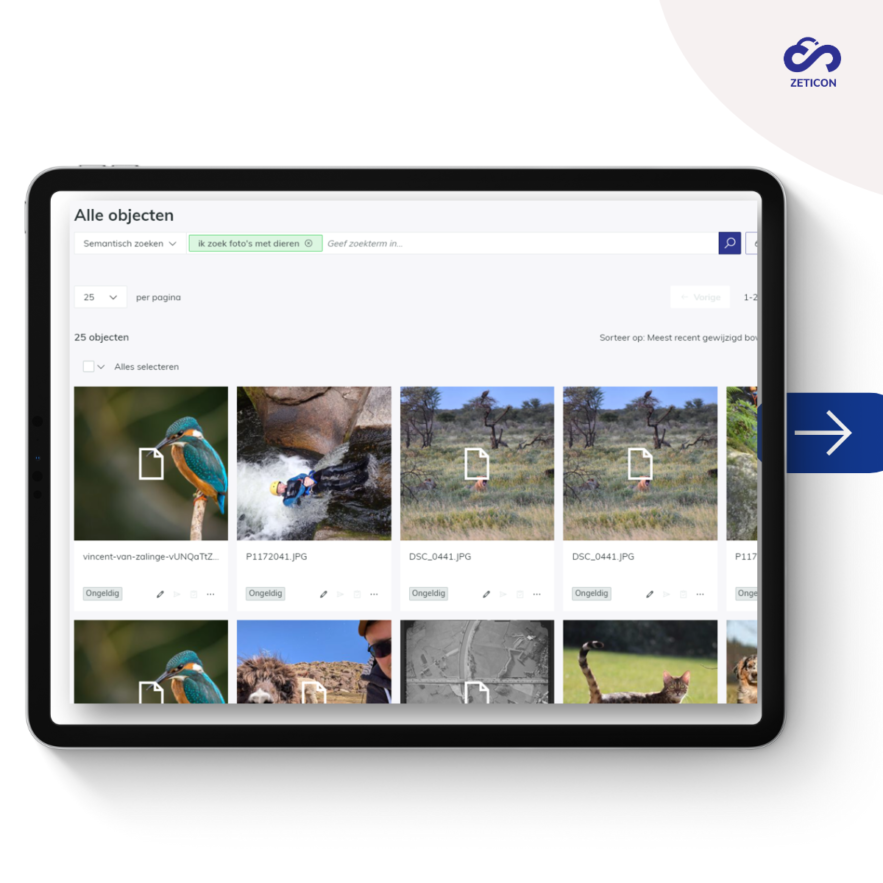Expand your insights into your digital business information thanks to semantic search

Are you ready to expand your insights into your digital business intelligence?With Zeticon's carefully selected AI features, you've already come a long way.Find out in this blog how semantic search can support your team in better collaboration, increasing your team's productivity.
Towards an intuitive search experience with semantic search
Traditional searching using a combination of keywords, specific metadata fields and filters requires time and knowledge of the available search options. To search very specifically, it is sometimes juggling between different search terms. Thanks to revolutionary semantic search, the traditional way of searching can be shaken up.
Semantic search, on the other hand, understands the context and meaning behind your search query. This means you get more related and relevant results, even if they don't use the exact same terms as in the metadata. In addition, semantic search is very intuitive: the system understands what you are looking for. It recognizes synonyms and variants. This also makes it a very effective way to search large amounts of data that has limited metadata.
The benefits of semantic search
- Quicker insight into relevant information
Users find the information they are looking for faster. Because the powerful feature recognizes relationships, you get all the relevant information back in just one search in a single view. Semantic search takes into account the context in which search terms are used. This allows the search algorithm to better respond to synonyms, variations in language usage, and even jargon, leading to a broader and more relevant search result. This saves a lot of user frustration. Moreover, the capabilities of semantic search closely match a “human” search experience or intent. The system analyzes the search query and understands what the user may additionally mean. This often helps the user get to relevant information faster without having to scroll through irrelevant results. In other words, you get back more information than just literal matches as in a traditional search. - Time and cost savings
Thorough metadata takes a lot of time. Semantic search is less dependent on accurate metadata than a traditional search. The feature is able to make logical connections between the search query and the assets available in the information platform. - More effective use of information in your big data
Rely on semantic search when manual tagging and filtering due to the large amounts of data in your intelligent information platform hinder or complicate traditional searches. Information is better organized by themes and ideas, rather than just terms. This gives you a more complete picture of complex topics, as multiple perspectives and related topics can emerge that were previously hidden. The AI feature recognizes patterns and makes connections between you all your assets. This allows you as a user to easily navigate and search through all the data in your platform. - Improved collaboration
Semantic search further highlights your information platform as a single source of truth for all your business information. The system recognizes connections between information from different teams. In this way, everyone in your organization can use all the information available in the platform more intuitively, without specific prior knowledge of certain keywords or metadata structures.

Conclusion
Semantic search is a huge step forward in making all the data available in your information platform intuitively searchable. This powerful feature helps you expand your insights and transform data into manageable, searchable and accurate information. No matter when you need it. Users find the right information in the right context faster. This results in increased productivity for your team, significant cost savings and an improved user experience. All within your trusted intelligent information platform.
Ready to maximize your search experience?
Start using semantic search today!